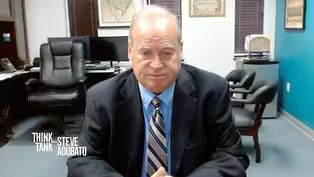
Interventional Cardiologist talks heart disease prevention
Clip: 9/27/2025 | 8m 11sVideo has Closed Captions
Interventional Cardiologist talks about advances in heart disease prevention
Steve Adubato is joined by Ramin Hastings, MD, Medical Director of the Structural Heart and Valve Program and Interventional Cardiologist at Englewood Health, to discuss advances in heart disease prevention and the impact of Medicaid cuts on cardiology patients.
Problems playing video? | Closed Captioning Feedback
Problems playing video? | Closed Captioning Feedback
Think Tank with Steve Adubato is a local public television program presented by NJ PBS

Interventional Cardiologist talks heart disease prevention
Clip: 9/27/2025 | 8m 11sVideo has Closed Captions
Steve Adubato is joined by Ramin Hastings, MD, Medical Director of the Structural Heart and Valve Program and Interventional Cardiologist at Englewood Health, to discuss advances in heart disease prevention and the impact of Medicaid cuts on cardiology patients.
Problems playing video? | Closed Captioning Feedback
How to Watch Think Tank with Steve Adubato
Think Tank with Steve Adubato is available to stream on pbs.org and the free PBS App, available on iPhone, Apple TV, Android TV, Android smartphones, Amazon Fire TV, Amazon Fire Tablet, Roku, Samsung Smart TV, and Vizio.
Providing Support for PBS.org
Learn Moreabout PBS online sponsorship- We have him back to talk about heart health, he is Dr.
Ramin Hastings, Interventional Cardiologist at Englewood Health.
Good to see you, Dr.
Hastings.
- Yeah, good to be back, thanks, Steve.
- You got it.
Hey, listen, hopefully, there's some good news about heart health, if you will.
The CDC just found that heart attack deaths have dropped significantly in the last several years, and coming from a family with heart issues, talk to us about that.
First of all, how much have they dropped?
Second of all, why?
- Yeah, so we've definitely seen a reduction in the sudden death in people die of heart attacks, and I think a lot of that has to do with prevention and our real focus on preventative care for our cardiac patients.
Number one, the advent of medications to help control cholesterol and blood pressure have significantly reduced the burden of coronary disease, which is blockages of the arteries of the heart, and has made the reduction in death from heart attacks possible, let's say.
And I think the second thing is, is the innovation in the field of cardiology in terms of how we treat our patients that come in with heart attacks has grown tremendously over the last 20 to 30 years.
So how patients are now taken care of when they have a heart attack has evolved from, you know, just putting them in a hospital and watching them, and, you know, a little bit of medical therapy, to now, we have a whole host of different treatments that are available for our patients when they have events, and that has also reduced the mortality from these heart attack events.
- Let me ask you this, it's anecdotal, but it's very real.
My grandfather, whom I never knew, my dad's father, passed at 44, my father's younger brother, Mike, passed at a very young age as well, sudden heart attacks.
Both of them smoked, okay?
And, you know, it's anecdotal, but it's not irrelevant, what is the correlation, the connection, scientifically and from your experience, Dr.
Hastings, between smoking and heart disease?
- Well, there's a direct correlation.
I mean, you know, I like to tell my patients that, especially if they have other risk factors.
So it sounds like you have some family history of heart disease, if you put smoking into that equation, it's like a little smoldering fire that you're pouring kerosene on.
And that's kind of analogy I like to use when we talk about smoking.
So there's certainly a direct correlation between the two.
I think it just augments your other risk factors.
Now, if you have a genetic profile where you'll never develop plaque and you smoke, you may not suffer heart attack, you know, throughout your lifetime.
But if you have other risk factors that preclude you to potentially developing plaque, smoking just puts that on like hyperdrive.
And so, you know, I think it's really important for everyone not to smoke, obviously, 'cause we think it's better, but specifically those that have other risk factors.
- Yeah.
Dr.
Hastings joined us several years ago.
If you wanna see the previous interview, check it out, our website, SteveAdubato.org, is up right now.
And let me also disclose, Englewood Health is an underwriter of our healthcare programming.
Dr.
Hastings, let me ask you this.
When we had you on last time, it was too soon to talk about long COVID, because COVID wasn't long at that point, it was early on.
What do we see, and what do we understand, about the correlation, the connection between long COVID and heart disease?
- Yeah, I think we're still learning, to be honest.
I don't think we've seen as much cardiac long-term effects from COVID.
I think most of the long-term effects from COVID are more on the lungs.
You know, I think a lot of the issue with COVID initially with heart problems was acute heart attacks and acute heart failure with patients that had COVID.
You know, we're not seeing a lot of the long-term, but I think one of the problems with that is that when you look at something like this, it's really population based.
And so I think that data is still being accrued to see if there is some increase.
But there's part of me that worries that like so many people died from the disease that, you know, we may not see much in terms of the long-term effects of COVID.
So, to be honest with you, in the hospital, in our outpatient practice, we don't think we're seeing a lot of kind of long-term effects of the COVID.
I think most of the long-term effects from COVID seem to be more in the lungs.
- Okay, let's talk about impact of decisions that are made from a public policy point of view.
Right now, the federal government, recently, this is the middle of July, will be seen later, very significant legislation was passed with fiscal implications in a whole range of areas including Medicaid, cuts to Medicaid.
Explain from your perspective as a clinician, not a politician voting in Washington or Trenton, (coughs) what is the connection in your view, Dr.
Hastings, between these Medicaid cuts, and the people that you attempt to help as it relates to their heart health?
- Yeah.
- What's the connection?
- Yeah, I mean, so anything that causes patients to lose their medical insurance, as a practicing physician, is really concerning, because when people do not have health insurance, they don't get their routine care, they're not doing preventative medicine.
And so, what ends up happening is that they get sick and show up at a hospital much further along on their disease process where, you know, treatments are not as good and are frankly a lot more expensive than what they would be if we had treated this in a more preventative, you know, stage.
So, as a clinician, any kind of effect that government does that reduces the number of people that have access to health insurance is obviously extremely concerning to us.
- Doctor, final question, are more and more Americans living with, quote, "chronic health," chronic heart issues, heart disease?
- Absolutely.
I think with a lot of these advances that we've made in the prevention of, you know, heart disease, it's kinda shifted kind of the patients that we're seeing now.
You know, people are living a lot longer, and so, instead of seeing the 50-year-old that has a massive heart attack and just dies, those patients are surviving, and now we have to manage those patients long-term.
So we have to deal with a lot more chronic heart disease as we move forward.
And a lot of the innovation that's going on in the field of cardiology is really dealing with that exact problem, is how do we manage long-term cardiac patients that their disease becomes a little bit more complex.
And so, I think that's where the future really is of cardiology.
- Hmm.
Dr.
Ramin Hastings, Interventional Cardiologist at Englewood Health.
Doctor, thank you for joining us, and we're smarter about heart health because of it.
Thank you, Doctor.
- Thank you, sir, appreciate it.
- You got it.
Stay with us, we'll be right back.
- [Narrator] Think Tank with Steve Adubato is a production of the Caucus Educational Corporation.
Funding has been provided by The New Jersey Economic Development Authority.
Lincoln Tech.
Eastern Atlantic States Regional Council of Carpenters.
Robert Wood Johnson Foundation.
New Jersey Children’s Foundation.
PSE&G.
Valley Bank.
EJI, Excellence in Medicine Awards.
A New Jersey health foundation program.
And by The Turrell Fund, a foundation serving children.
Promotional support provided by NJBIA.
And by New Jersey Globe.
- I'm Tim Sullivan, CEO of the New Jersey Economic Development Authority.
Since joining the NJEDA, I've been struck by the incredible assets and resources that New Jersey has to offer.
The NJEDA is working every day to grow New Jersey's economy in a way that maximizes the values of those assets to benefit every single New Jersey resident.
This includes more support for small businesses and a focus on reclaiming New Jersey's position as a leader in the innovation economy.
Visit njeda.com to learn more about how NJEDA is building a stronger and fairer New Jersey economy.
Examining independent media & priorities for NJ governor
Video has Closed Captions
Clip: 9/27/2025 | 10m 26s | Examining independent media and the key priorities for NJ's next governor (10m 26s)
Examining the impact of tariffs, AI, and energy costs in NJ
Video has Closed Captions
Clip: 9/27/2025 | 9m | Examining the impact of tariffs, AI, and energy costs in NJ (9m)
Providing Support for PBS.org
Learn Moreabout PBS online sponsorship
- News and Public Affairs

Top journalists deliver compelling original analysis of the hour's headlines.

- News and Public Affairs

FRONTLINE is investigative journalism that questions, explains and changes our world.












Support for PBS provided by:
Think Tank with Steve Adubato is a local public television program presented by NJ PBS

